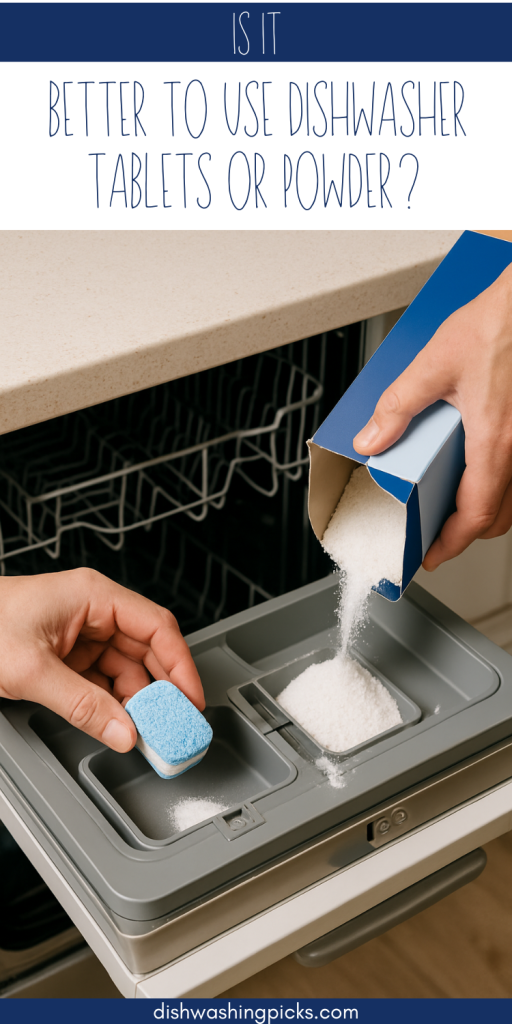
Let’s be honest: You just want your dishes clean… but now you’re standing in the detergent aisle, staring down a wall of choices. Tabs? Powder? Gel? What is the right move?
Ever feel like you need a chemistry degree to run your dishwasher? Yeah, you’re not alone.
So, if you’ve ever wondered, “Should I go for those fancy pre-measured tablets or just stick with old-school powder?” — grab your coffee (or wine, no judgment), and let’s talk about it.
1. Dishwasher Tablets: Set It and Forget It
Alright, let’s start with the rockstars of convenience: dishwasher tablets.
They’re pre-measured, mess-free, and often packed with extras like rinse aid and degreaser. You pop one in, press start, and voilà—no measuring, no fuss.
Think of them like the Keurig pods of the dishwashing world.
Pros:
- Super convenient (no scooping or guessing)
- Often include added cleaning agents
- Easy to store and handle
- Great for consistent results
Cons:
- Usually more expensive per wash
- Might be too much for smaller or lightly soiled loads
- Not always eco-friendly (some have plastic wrappers)
Imagine this: You’re cleaning up after a dinner party. Piles of plates, greasy pans, wine glasses with mystery smudges. Toss in a tablet and go relax—you’ve earned it.
2. Dishwasher Powder: The Classic Workhorse
Now on to powder. The OG. The unsung hero of frugal kitchens everywhere.
It’s basic, no-frills, and gives you more control. Got a light load? Use less. Got a casserole dish that looks like a battlefield? Use a bit more.
It’s like making your coffee how you like it, instead of letting a machine decide.
Pros:
- More cost-effective per load
- Lets you adjust the dose based on the load
- Less packaging waste (especially if you buy in bulk)
Cons:
- Easy to over- or under-measure
- Can clump if stored in humid areas
- Doesn’t usually include rinse aid or extras
If you’re the kind of person who wants control over every scoop and sprinkle—powder might be your jam.
3. Which One Actually Cleans Better?
Here’s the thing: both work, but it depends on your dishwasher, your water quality, and how dirty your dishes are.
- Tablets tend to shine in high-performance machines and hard water conditions.
- Powder gives you flexibility but relies more on user knowledge.
A study by Consumer Reports found tablets often outperform powder on heavy-duty messes, but powders did just fine—especially if you pre-rinse (which we know you secretly still do… even if the manual says not to 😅).
4. Eco & Budget Considerations
Looking to save money or be more eco-conscious? Here’s how they stack up:
| Feature | Tablets | Powder |
| Cost per load | Higher | Lower |
| Packaging | Often more plastic | Less, especially bulk |
| Additives | Built-in | Must be added manually |
| Waste risk | Less dosing error | More potential for waste |
So, if you’re on a budget and don’t mind a little scooping, powder can save you some cash. But if you’re all about ease and consistency? Tablets are your friend.
Final Thoughts: What’s Better? Well… It Depends
There’s no one-size-fits-all here. The best option is the one that fits your lifestyle.
👉 Want simplicity and consistent results? Go for tablets.
👉 Prefer control and cost savings? Stick with powder.
👉 Love a clean kitchen and a clean planet? Look into eco-friendly powders or tablets in water-soluble wrappers.
At the end of the day, the only wrong answer is using laundry detergent in the dishwasher (seriously, don’t do it).
